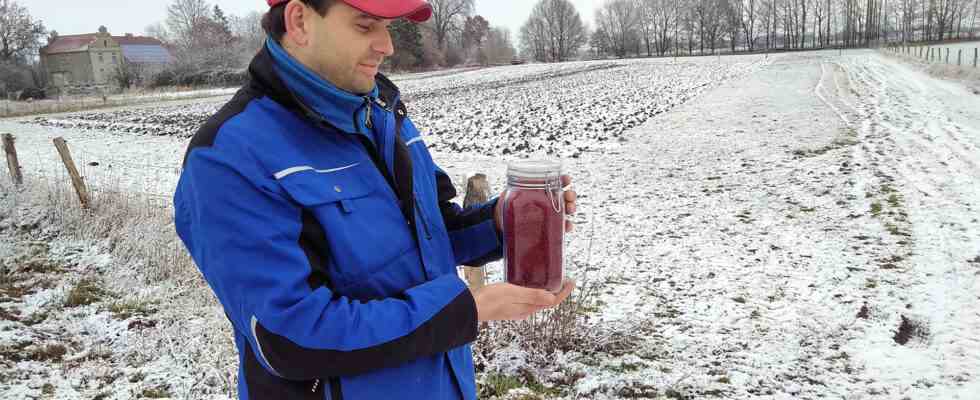report
Status: 01/29/2023 3:04 p.m
Regional organic products sell well, especially in big cities. Good enough to also offer space for small and exquisite niches. A one-man business in Brandenburg produces the precious spice saffron.
Tobias Fahlberg bends over the frost-covered field and examines his protégés. With one hand he brushes aside the thin layer of snow and reveals one of the plants. An inconspicuous green plant appears: the saffron crocus – from which one of the most expensive spices in the world is obtained. Saffron is mainly known from the Orient. Fahlberg grows it in the Oderbruch, just before the Polish border in eastern Brandenburg.
Farmer – in miniature
His plants apparently have no problems with the weather, “undemanding and robust”, as Fahlberg describes him. “The growing season is in winter. The advantage is: no insects!” It’s cold, it’s supposed to snow soon, but Fahlberg doesn’t mind. He is actually a trained civil engineer, “that means drawing and arithmetic – above all arithmetic,” as he says. After a few years at his desk, he realized: “I had to get out.” So he became a farmer – on a small scale.
His field is – compared to conventional agriculture – downright tiny: 2000 square meters. Fahlberg has two more, totaling just half a hectare. In one year, the area under cultivation should be twice as large – and bring in enough income for him and his family. “We have a very high added value for space,” says Fahlberg.
Every gram is valuable
Saffron can be used in many ways: in tea or lemonade, as a spice for chicken or cakes. It is also said to strengthen the body’s defenses and even have an antidepressant effect, says Fahlberg: “And: as an aphrodisiac. You can also try that out. If you chew 0.1 grams of saffron threads in your mouth and wash them down with a glass of water.”
The global annual production of saffron is just around 200 tons, 180 of which come from Iran. Fahlberg harvested 500 grams last year. Every single one of them is precious. Buyers in the supermarket pay around five euros for a tenth of a gram.
It is a potentially very lucrative market niche that Fahlberg has discovered. Saffron farmers are a rarity in Germany. “Our customers want organic, regional and are willing to pay money for it,” he says. These customers are mainly found in Berlin and other large cities. So far, Fahlberg has sold its harvest in its online shop or directly to restaurants. As of this week, his saffron is also available in some Berlin branches of a supermarket chain.
Organic handcrafted
He already has the organic seal. Fahlberg literally earns it with his hands – for example by fighting weeds. “No chemicals,” he emphasizes. Instead, he has his field plowed and loosened before sowing to get rid of weeds. Once the plants are in the ground, he gets to work on the weeds between the seedlings on his knees. “I pluck it out by hand. You can only manage two to three rows a day at most. That’s honest work too.”
It is also harvested by hand by picking each flower individually with your fingers. After that, processing begins. Fahlberg describes his farm like this: “The production facility is: a room, a table, a chair. And a gold scale.” He carefully plucks the actual spice from the flowers: the three-part pistil that supplies the orange-red saffron threads.
Everything is done by hand: from weed control to harvesting and packaging.
Image: Andre Kartschall / rbb
Then they are dried, losing up to 80 percent of their weight. What is left is his merchandise. Fahlberg had it certified by means of spectral analysis by a special French laboratory. The result: His saffron is of the highest quality.
He weighs the dried threads and packs them in special foil, UV-shielding, for durability – individually, 0.1 grams each, by hand. He also takes care of the shipping himself. More organic farmers are hardly possible.

